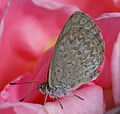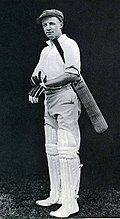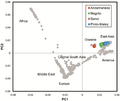Portal:Australia
| Showcase | Content | Interesting facts | Contributing |
Introduction
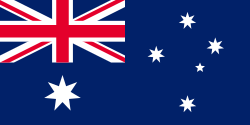
Australia, officially the Commonwealth of Australia, is a country comprising the mainland of the Australian continent, the island of Tasmania and numerous smaller islands. It has a total area of 7,688,287 km2 (2,968,464 sq mi), making it the sixth-largest country in the world and the largest in Oceania. Australia is the world's flattest and driest inhabited continent. It is a megadiverse country, and its size gives it a wide variety of landscapes and climates including deserts in the interior and tropical rainforests along the coast.
The ancestors of Aboriginal Australians began arriving from south-east Asia 50,000 to 65,000 years ago, during the last glacial period. By the time of British settlement, Aboriginal Australians spoke 250 distinct languages and had one of the oldest living cultures in the world. Australia's written history commenced with Dutch exploration of most of the coastline in the 17th century. British colonisation began in 1788 with the establishment of the penal colony of New South Wales. By the mid-19th century, most of the continent had been explored by European settlers and five additional self-governing British colonies were established, each gaining responsible government by 1890. The colonies federated in 1901, forming the Commonwealth of Australia. This continued a process of increasing autonomy from the United Kingdom, highlighted by the Statute of Westminster Adoption Act 1942, and culminating in the Australia Acts of 1986.
Australia is a federal parliamentary democracy and constitutional monarchy comprising six states and ten territories. Its population of almost 28 million is highly urbanised and heavily concentrated on the eastern seaboard. Canberra is the nation's capital, while its most populous cities are Sydney and Melbourne, both with a population of more than 5 million. Australia's culture is diverse, and the country has one of the highest foreign-born populations in the world. It has a highly developed economy and one of the highest per capita incomes globally. Its abundant natural resources and well-developed international trade relations are crucial to the country's economy. It ranks highly for quality of life, health, education, economic freedom, civil liberties and political rights.
Featured article -
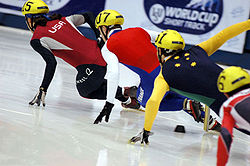
Australia first competed in the Winter Olympic Games in 1936 in Garmisch-Partenkirchen, and has participated in every games since, with the exception of the 1948 Games in St. Moritz. (Full article...)
Selected biography -
Daisy Jugadai Napaltjarri (c. 1955 – 2008) was a Pintupi-Luritja-speaking Indigenous artist from Australia's Western Desert region, and sister of artist Molly Jugadai Napaltjarri. Daisy Jugadai lived and painted at Haasts Bluff, Northern Territory. There she played a significant role in the establishment of Ikuntji Women's Centre, where many artists of the region have worked. (Full article...)
Did you know (auto-generated) -
- ... that a species of Australian ant has special workers that make honey, and is considered a delicacy by Aboriginal Australians?
- ... that the arts magazine Paper Chained was banned in some Australian prisons due to its pen-pal program?
- ... that Episode 7921 of Neighbours featured Australia's first televised fictional same-sex wedding since the country voted in favour of legalising same-sex marriage?
- ... that in the 1920s, Australian journalist E. George Marks predicted military conflict in the Pacific between Japan and the United States?
- ... that Australian official Jack Emanuel was awarded the George Cross in 1971 after being stabbed to death whilst trying to resolve a land dispute with the Tolai people of New Guinea?
- ... that Margaret Reid is the first woman to have served as President of the Australian Senate?
- ... that Sarah Cox brought the first breach of promise suit in Australia, during which she was represented by her future husband William Wentworth?
- ... that on its maiden voyage from Liverpool to Australia, the George Roper ran aground and was wrecked?
In the news
- 20 April 2025 –
- The death toll from drownings during the week across Australia increases to seven after a fisherman was killed after being swept off rocks near Sydney. Three people remain missing and one other was injured. (Philippine Daily Inquirer)
- 7 April 2025 – Tariffs in the second Trump administration, Executive orders in the second presidency of Donald Trump
- The Nikkei 225, SSE Composite Index, and Hang Seng Index experience substantial losses following Friday’s losses on the New York Stock Exchange as a result of U.S. president Donald Trump's tariffs. European markets also decline, particularly in banking and defense sectors. The ASX 200 in Australia and the Kospi in South Korea also closes lower. (BBC News)
- 2 April 2025 – Tariffs in the second Trump administration
- In the 10% tariff, the U.S. lists the Australian territory of Heard Island and McDonald Islands near Antarctica, despite the fact that it has no human inhabitants, imports or exports. In response to finding these islands in the list, Australian prime minister Anthony Albanese commented that "Nowhere on earth is safe" for the tariff. (The Guardian)
- 31 March 2025 – Australia–North Korea relations
- The Royal Australian Air Force deploys a long-range maritime patrol aircraft P-8 Poseidon to Kadena Air Base in Okinawa Prefecture, Japan, to monitor North Korean maritime activities in the Yellow Sea, including weapons shipments prohibited under international sanctions. (NK News)
- 8 March 2025 – 2024–25 Australian region cyclone season
- Cyclone Alfred
- One person is confirmed killed and thirteen others are injured in floods caused by Cyclone Alfred as it passes through Queensland and New South Wales, Australia. (AP)
Selected pictures -
On this day
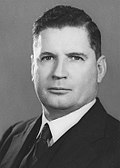
- 1861 – On the Burke and Wills expedition, Burke, Wills, and King return to their base camp at Cooper Creek, having crossed the Australian continent from Melbourne to the Gulf of Carpentaria.
- 1883 – George Ernest Morrison arrives in Melbourne, Victoria, having walked 3,270 kilometres (2,030 mi) from Normanton, Queensland.
- 1970 – The Hutt River Province, a 75-square-kilometre (29-square-mile) property outside Northampton, Western Australia, declares its independence from Australia in response to new wheat production quotas, becoming Australia's first micronation.
- 1973 – Sir Arthur Fadden (pictured), the 13th Prime Minister of Australia, dies in Brisbane at the age of 79.
- 1976 – A gang of six men steal between A$6 million and 12 million from the Victoria Club, located in Queen Street, Melbourne.
- 1995 – Sir Gerard Brennan is appointed to the position of Chief Justice of Australia, succeeding Sir Harry Gibbs.
General images
Topics
More portals
WikiProject
 |
 |

| |
Consider joining WikiProject Australia, a WikiProject dedicated to improving Wikipedia's coverage of topics related to Australia. The project page and its subpages contain suggestions on formatting and style of articles, which can be discussed at the project's notice board. To participate, simply add your name to the project members page.
As of 21 April 2025, there are 208,043 articles within the scope of WikiProject Australia, of which 598 are featured and 894 are good articles. This makes up 2.98% of the articles on Wikipedia, 5.27% of all featured articles and lists, and 2.15% of all good articles (see WP:AUSFG). Including non-article pages, such as talk pages, redirects, categories, etc., there are 416,086 pages in the project.
Associated Wikimedia
The following Wikimedia Foundation sister projects provide more on this subject:
-
Commons
Free media repository -
Wikibooks
Free textbooks and manuals -
Wikidata
Free knowledge base -
Wikinews
Free-content news -
Wikiquote
Collection of quotations -
Wikisource
Free-content library -
Wikiversity
Free learning tools -
Wikivoyage
Free travel guide -
Wiktionary
Dictionary and thesaurus











